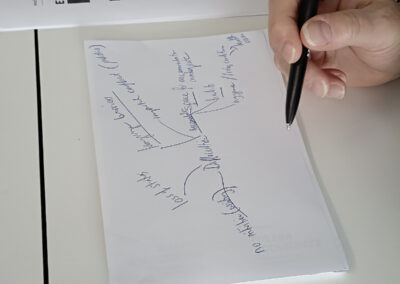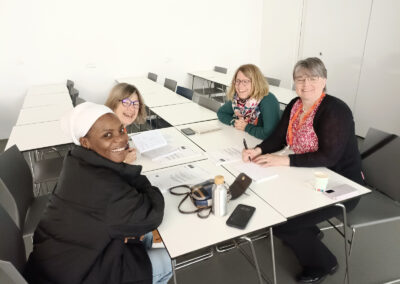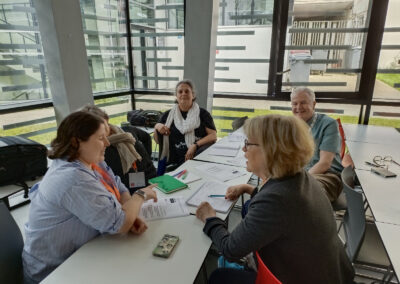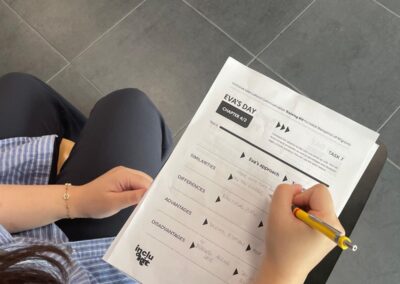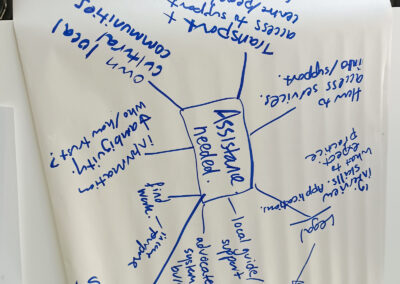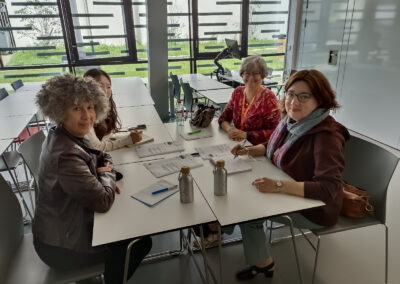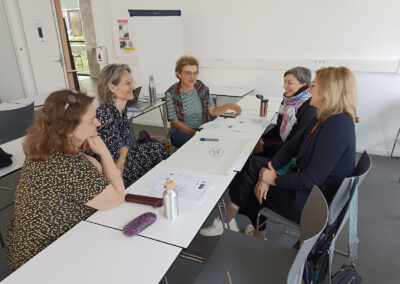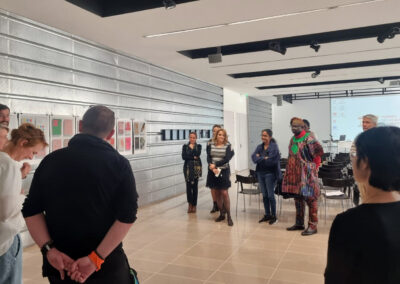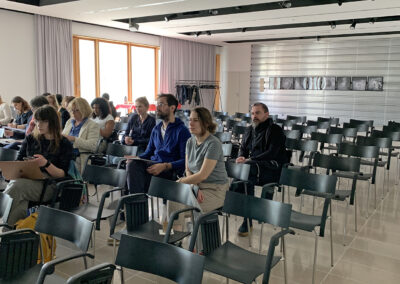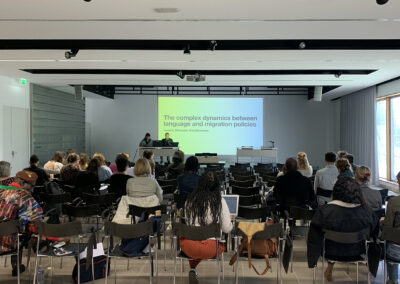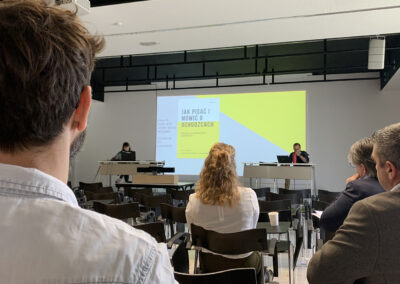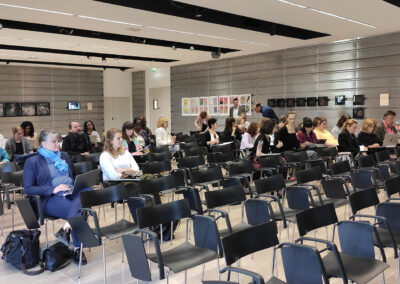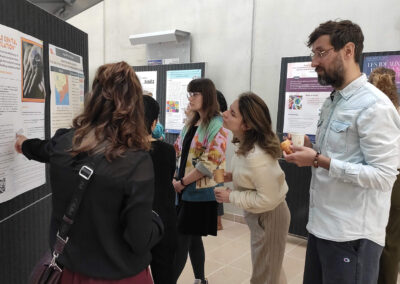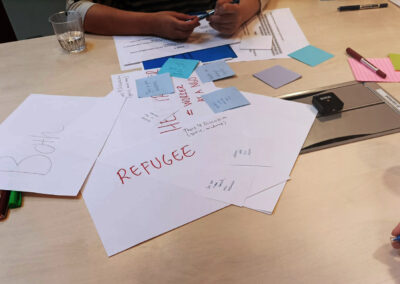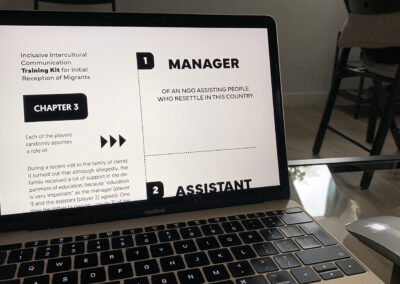IncluKIT is a training kit aimed at the whole spectrum of volunteers and professionals involved in the initial reception of newly arrived migrants in European countries, focusing on the analysis of mismatched expectations and misunderstandings during this transitional phase.
Built on multiple case studies of critical incidents of professionals and volunteers working in reception of migrants or refugees, IncluKIT transposes typical conflict or challenging situations into case stories that can be easily imagined and playfully explored in order to induce reflexivity and allow all parties involved in the process to develop mutual understanding and increase intersubjectivity. It consists of standalone session materials that guide participants (ideally few of them) with or without a facilitator, through subsequent tasks and assignments finishing with a debriefing checklist.
The kit is designed for all the people working with migrants, based on an in-depth study of their respective needs. It makes use of recent academic research on interculturality to go beyond the limits of traditional tools for raising awareness of cultural differences. IncluKIT provides a practical application of critical theoretical approaches, based on varied and innovative methodologies, in a user-friendly format. The training kit is accessible free of charge and can be used in various contexts (state-sponsored institutions, NGOs, educational/academic communities, private businesses) and adapted to specific local realities.
IncluKIT is the FIT FORTHEM co-creation pilot project of the FORTHEM Lab Diversity & Migration. FORTHEM is an alliance of nine European universities, six of which are involved in IncluKIT: Università degli Studi di Palermo (Italy), Johannes Gutenberg-Universität Mainz (Germany), Université de Bourgogne (France), Jyväskylän Yliopisto (Finland), Uniwersytet Opolski (Poland) and Universitat de València (Spain). The two external stakeholders for the project are SIETAR Europa and diversophy®, with the support of SIETAR Switzerland and the SIG Migration.
Contact: inclukit@gmail.com
Inclusive Intercultural Communication Training Kit for Initial Reception of Migrants



DOWNLOAD
IncluKIT




IncluKIT
RESEARCH
Lessons from turning critical incident stories into reflexivity training
The need for bidirectional reflexivity
A plethora of conversations take place among policymakers and some academics in European public spheres and media about the need for integration of newcomers arriving in the old continent. Some of these conversations focus on the need for rapid assimilation of people who migrate into society due to alleged “cultural differences”, a term that is vaguely, albeit frequently used in the context of migration (Dodevska 2023). Critical approaches to interculturality have shown how the trope of “cultural differences” is used to mask power differentials in contexts of social interaction, and operates on a form of reductionist stereotyping that does not accurately reflect reality (Primecz et al., 2016). Our research group finds these ideas both unjust and unrealistic, as any social coexistence must involve both parties working towards their common grounds (Klarenbeek, 2021).
Such a bidirectional process is complex, prone to misunderstandings and conflicts, yet it constitutes the only fair way forward (Lefringhausen et al., 2023). We acknowledge that human groups are different, follow different patterns of behaviour or adhere to different normative orders. In our view, any meaningful communication under such circumstances requires both getting to know the difference and ignoring it at the same time, treating newcomers as others and ours simultaneously. Such a dialectical approach requires that both parties exercise open mindedness, careful reflexivity and critical thinking both towards the other party and themselves. We consider IncluKIT to be one of “the necessary interventions that strengthen resilience in living with difference” (Meissner & Heil, 2021, p. 753).
In order to disentangle these complexities, it seems counterproductive to learn cultural mores and peculiarities of the newcomers in order to act upon them from the power positions of the hosts. Instead, we propose to engage in taking diverse perspectives, questioning oneself and our presumptions, identifying tacit assumptions and unspoken expectations as recent developments in intercultural communication education tend to suggest (Dervin & Jacobsson, 2022). IncluKIT is designed in such a way that it allows for playful and creative engagement with one’s own assumptions about others, especially in the context of receiving newcomers in European countries.
Built on multiple case studies of critical incidents of professionals and volunteers working in the reception of migrants and/or refugees, IncluKIT transposes typical conflict or challenging situations into case stories that can be easily imagined and playfully explored in order to induce reflexivity and allow all parties involved in the process to develop mutual understanding and increase intersubjectivity. It consists of standalone session materials that guide participants (ideally few of them) with or without a facilitator, through subsequent tasks and assignments finishing with a debriefing checklist.
For practical reasons, IncluKIT in the pilot phase is intended as a tool for those working on the receiving side at the moment. Ultimately it is meant as a multi-perspective intercultural communication training material.
Transforming research into an educational tool
IncluKIT was conceived as a co-creation seed funding project within a European University Alliance. Conducted in a networked “Diversity and Migration” lab by several universities from across the continent, it comprised two empirical phases preceded by a review of existing training kits in the field of intercultural communication and the creation of an interview guide inspired by the 3R tool: report, reflect & re-evaluate (Spencer-Oatey & Davidson, 2018).
The first field phase yielded 18 semi-structured interviews with volunteers, professionals and people who migrated to Europe. The team coded the qualitative material in three rounds, highlighting patterns and problems. The process resulted in the construction of several themes: positive and negative incidents, relationships between the providers and receivers of assistance, the importance of training and the importance of language.
The participants obviously reported positive and negative experiences (Guhan & Liebling-Kalifani, 2011), i.e. critical incidents that were solved (positive) or the solutions they failed to find (negative). The causes of the critical incidents were internal and external. The internal ones encompass mostly the mismatch of expectations between both parties involved in the communication, related in general to the relationship between help providers and people who migrate. The external causes consist mostly of the inaccessibility of resources and of health issues beyond the capacity of the involved actors.
In the reports of the participants, the relationship between help providers and people who migrate appears as both hierarchical (Carlsen et al., 2022) and heavily related to the expectations of involved parties (Lubbers, 2021). The list of expectations that surfaced in this study includes, among others, service providers expecting the beneficiaries to follow the rules and the procedures; adhere to established communicative norms; report every issue; and the beneficiaries expecting to find immediate solutions; additionally, we discovered the service persons’ tacit expectation for gratitude. These expectations seem to loom over the mutual rapport.
Under such circumstances, the professionals and the volunteers in the field both admit to a scarcity of training (Lintner, 2020). Training is often mentioned by the research participants as a potential catalyst of the interactions and communication, but other areas are also mentioned, especially the need for psychological training, resilience skills and intervention capacity. The former exceeds the scope of this project, despite being critical and interwoven with the latter (Jobst et al., 2018). We reckon these are extremely sensitive topics that are best left to specialists in the field. We made an ethical decision together with the external stakeholders, not to explore this path at this stage of the project.
The language of the receiving state is naturally a gateway to essential information and resources for people who relocate there (Morrice et al., 2021). Our data shows that both parties used their resources creatively to facilitate communication, for example using translating apps or involving intermediaries. However, in situations where brokers are involved, it can restrict direct communication and limit the involvement and agency of people who migrate.
The results of the first phase of the analysis led us to formulate two research questions:
(1.) How can such real-life critical incidents be efficaciously transformed into pedagogical tools for both professionals and volunteers engaged in the reception?
(2.) How can these training tools be designed to avoid the perpetuation of stereotypes often framed as “cultural differences”?
Both of these enquiries were answered in the subsequent stages of the project, specifically during the design and testing. The broad answer to the first one was found in utilising playful principles for the critical application of gamification pedagogy.
Careful gamification
As the training kit is ultimately an educational tool, elements of gamification were incorporated in order to engage participants as well as offer simulated scenarios that facilitate the practical application of skills in real-life situations (Shrier, 2021). Such simulations provide an opportunity to enhance learning outcomes. In this case, they included:
- Ability to take different perspectives,
- Awareness of one’s expectations towards another party,
- Self-reflection,
- Acknowledgement of subjectivity,
- Exploration of alternative solutions,
- Analysis of power dynamics,
- Collection and synthesis of relevant information,
- Application of systemic thinking to understand the interactions and interdependencies in real-life situations,
- Mapping available resources for effective problem-solving, and
- Conducting evaluation of different solutions.
These learning objectives were next operationalized into interactive case stories comprising descriptions of critical incidents and illustrative quotes, followed by facilitating prompts. These inquiries include individual tasks and group discussions focusing on adopting different perspectives and challenging participants’ assumptions. Such an approach enabled the first transformation of the collected data into gamified narratives that users of the kit can engage with both creatively and critically (Shrier 2021; Siitonen 2022). Additionally, simulated scenarios immerse participants in various social contexts, helping to scaffold practices and skills which can be applied in the future (Fowler & Pusch, 2010), thus inciting a deeper understanding and practical application of the learning objectives presented in the interactive case stories.
To ensure that the learning objectives are met and to maintain control of the narrative, a debriefing session concludes each “case narrative” (Siitonen 2022). During this phase, participants can reflect on the goals of the case stories. Furthermore, at the end of the session, the purpose of each case story is revealed to the participants.
To assess the feasibility of achieving the case stories’ goals, multiple testing sessions were conducted in three different locations involving participants from diverse backgrounds. We also sought input from external partners, who are experts and practitioners in the field of intercultural training, to evaluate the kit. These testing sessions uncovered issues related to language accessibility, inclusivity, understanding instructions, and the context of certain quotations. As a result, we made adjustments to enhance the language accessibility and inclusivity of the case stories and tasks. Furthermore, the testing emphasised the significance of facilitators – who do not only lead participants through the tasks and activities but also clarify the context or terms used in the stories. For this reason, we included detailed instructions for facilitators.
There are many limitations of this training kit, ranging from the limited language options and number of stories (and types of issues in the field) that we were capable of developing so far to the issue of unfacilitated use. While this resulted from a deliberate choice, a transversal problem lies in the kit’s intrinsic inability to address much more palpable and burning issues that are faced by the people who migrate and those who assist them on arrival. These include psychological issues stemming from traumatic experiences but also fundamental legal and survival-related problems. These cannot be solved by the kit, yet we realise that these problems are incremental and that without solving them it is very often next to impossible to shift the focus to such soft issues as communication and mutual understanding.
Nevertheless, these issues topping the hierarchy of most burning problems allegedly mask the underlying difficulties with communication. Our external stakeholders and the research participants alike felt that the communication is as pivotal as these material problems of a high gravity to people who migrate.
Access, use and further research
The kit is now available in open access and in a printer friendly layout, in an accessible design meant for face-to-face training around a table. It is meant for facilitated and unfacilitated use and comprises three case narratives and a main manual. Further research and development include incorporating more cases and more European contexts as well as collecting feedback from actual users. The groups of involved service providers and reception workers may be also widened to include policy makers, law enforcement officers or social services state workers. Last but not least, versions will be developed targeting participants who migrate, and not only those who work on the receiving end of the migration services spectrum. As we envision creating playful spaces to facilitate intersubjectivity and actual dialogue, more languages will be added besides English, which is now the sole option of the project that has just come out of its beta phase.
References
Carlsen, H. B., Doerr, N., & Toubøl, J. (2022). Inequality in Interaction: Equalising the Helper–Recipient Relationship in the Refugee Solidarity Movement. VOLUNTAS: International Journal of Voluntary and Nonprofit Organizations, 33(1), 59–71. https://doi.org/10.1007/s11266-020-00268-9
Dervin, F., & Jacobsson, A. (2022). Intercultural Communication Education: Broken Realities and Rebellious Dreams. Springer Nature. https://doi.org/10.1007/978-981-19-1589-5
Dodevska, I. (2023). Boundary integrationism and its subject: Shifts and continuities in the EU framework on migrant integration. Journal of Ethnic and Migration Studies, 1–24. https://doi.org/10.1080/1369183X.2023.2247170
Fowler, S. M., & Pusch, M. D. (2010). Intercultural Simulation Games: A Review (of the United States and Beyond). Simulation & Gaming, 41(1), 94–115. https://doi.org/10.1177/1046878109352204
Guhan, R., & Liebling-Kalifani, H. (2011). The Experiences of Staff Working With Refugees and Asylum Seekers in the United Kingdom: A Grounded Theory Exploration. Journal of Immigrant & Refugee Studies, 9(3), 205–228. https://doi.org/10.1080/15562948.2011.592804
Jobst, E., Gall, C., Eiche, C., Birkholz, T., & Prottengeier, J. (2018). Do good, stay well. Well-being and work satisfaction among German refugee helpers: A national cross-sectional study. PLOS ONE, 13(12), e0209697. https://doi.org/10.1371/journal.pone.0209697
Klarenbeek, L. M. (2021). Reconceptualising ‘integration as a two-way process.’ Migration Studies, 9(3), 902–921. https://doi.org/10.1093/migration/mnz033
Lefringhausen, K., Marshall, T. C., Ferenczi, N., Zagefka, H., & Kunst, J. R. (2023). Majority members’ acculturation: How proximal-acculturation relates to expectations of immigrants and intergroup ideologies over time. Group Processes & Intergroup Relations, 26(5), 953–984. https://doi.org/10.1177/13684302221096324
Lintner, C. (2020). Professionalisation for what? Reflections on social work practices with asylum seekers at the interface between spatial proximity, emotional distress and professional distance. European Journal of Social Work, 23(3), 449–460. https://doi.org/10.1080/13691457.2019.1699778
Lubbers, M. J. (2021). In Good Company? Personal Relationships, Network Embeddedness, and Social Inclusion. Social Inclusion, 9(4), 203–210. https://doi.org/10.17645/si.v9i4.5049
Meissner, F., & Heil, T. (2021). Deromanticising integration: On the importance of convivial disintegration. Migration Studies, 9(3), 740–758. https://doi.org/10.1093/migration/mnz056
Morrice, L., Tip, L. K., Collyer, M., & Brown, R. (2021). ‘You can’t have a good integration when you don’t have a good communication’: English-language Learning Among Resettled Refugees in England. Journal of Refugee Studies, 34(1), 681–699. https://doi.org/10.1093/jrs/fez023
Primecz, H., Mahadevan, J., & Romani, L. (2016). Why is cross-cultural management scholarship blind to power relations? Investigating ethnicity, language, gender and religion in power-laden contexts. International Journal of Cross Cultural Management, 16(2), 127–136. https://doi.org/10.1177/1470595816666154
Schrier, K. (2021). We the Gamers. Oxford University Press. https://doi.org/10.1093/oso/9780190926106.003.0001
Siitonen, M. (2022). Playing critically: Using digital intercultural simulation games in higher education. In Interculturality in Higher Education. Routledge. https://doi.org/10.4324/9781003322702
Spencer-Oatey, H. & Davidson, A. (2018). The 3R Reflect Tool: Developing Evaluation Sensitivity in Intercultural Encounters. V.2. Available at www.warwick.ac.uk/globalknowledge
Authors: Nerea Hernaiz Agreda (Department of Didactics and School Organization, University of Valencia, nerea.hernaiz@uv.es), Joanna Wrzesień-Kwiatkowska (Institute for Slavic, Turkic and Circum-Baltic Studies, Johannes Gutenberg University, Mainz, kwiatow@uni-mainz.de), Michał Wanke (Department of Cultural Studies, University of Opole & Center for Advanced Studies on Population and Religion, Cracow University of Economics, michal.wanke@uni.opole.pl)
Publication date: Nov 6, 2023
Suggested citation (in APA style): Hernaiz Agreda, N., Wrzesień-Kwiatkowska, J., Wanke, M. (2023). Lessons from turning critical incident stories into reflexivity training. Available at https://www.forthem-alliance.eu/inclukit
download a PDF version
IncluKIT
HISTORY
Learn More
IncluKIT emerged from the FORTHEM Lab Diversity and Migration in late 2021 as a response to a call for funding for a pilot project based on a co-creation approach with stakeholders from civil society. Researchers from the Lab are all involved in the reception of migrants in the cities where they are based and are keen to use scientific knowledge to improve the situation of migrants in their host societies. Previous research carried out locally had revealed that mismatched expectations and misunderstandings could be an issue in the interactions between newly arrived migrants and volunteers or professionals involved in their reception. These issues are sometimes overlooked during the reception process, and it is often assumed that migrants should spontaneously adapt to their host culture.
To address this situation, the project aimed at creating an inclusive intercultural communication training kit for the initial reception of migrants across Europe, called IncluKIT. It makes use of recent academic research on interculturality to go beyond the limits of traditional tools for raising awareness of cultural differences. The project provides a practical application of critical approaches, based on varied and innovative methodologies, in a user-friendly format. The training kit is accessible free of charge to be used in various contexts (state-sponsored institutions, NGOs, educational/academic communities, private businesses) and adapted to specific local realities.
Researchers from the Lab are closely connected with various not-for-profit organisations in their local environments. The external stakeholders chosen for the project are the Society for Intercultural Education, Training and Research (SIETAR) and more specifically SIETAR Europa, SIETAR Switzerland, SIETAR France and the SIETAR Special Interest Group on Migration, since the researchers had already worked with them on other projects. SIETAR members provided expertise on intercultural training and have been involved in various initiatives around migrant reception. As the training kit involves an element of gamification, it was also decided to invite George Simons and his team at diversophy®, who design and develop intercultural games in cooperation with SIETAR members.
After receiving a positive response from the FIT FORTHEM evaluation board in February 2022, IncluKIT was officially launched on 5 May 2022 following a preparatory phase during which the support of the external stakeholders was secured and the project was publicised within our universities. The first phase, consisting of background research, took place during the summer and fall of 2022. Academic literature on themes related to the project was reviewed as well as existing intercultural training tools aimed at migrants and people involved in their reception. Interviews with migrants, volunteers and professionals were also conducted to identify recurrent issues linked to cultural differences in the reception process.
The results of the research phase were presented in November 2022, after which in-depth exchanges with SIETAR experts took place to collect their input on the project. The RAAS project (Refugees and People Seeking Asylum) conducted by SIETAR UK and the Perspectives-Studies project conducted by SIETAR Switzerland were important sources of inspiration. Meetings with the diversophy® teams were organised, as they recently developed free intercultural games for migrants.
In January 2023, the second phase of the project was launched, consisting of the design and development of the kit. Following up on the input from SIETAR experts, cases of challenging situations (critical incidents) linked to intercultural communication in the interactions between migrants and volunteers during the reception process were collected by the various partner universities. They were then gamified with the help of the diversophy® teams, using reflexive and creative approaches.
By June 2023, two prototypes for the kit were finalised and were then tested in various locations and with various audiences over the summer. Feedback on the testing sessions was collected through an online questionnaire for the participants and an observation sheet completed by the researcher in charge of the session. The feedback was used to optimise the prototypes. Simultaneously, the visual design was developed in collaboration with colleagues at the faculty of arts of the University of Opole.
In November 2023, IncluKIT was officially launched and made accessible to the public through a dedicated website. However, this is not the end of the project. The kit will be disseminated as widely as possible with the help of our stakeholders, and optimisation will continue based on the feedback collected from users around Europe. IncluKIT will be presented in various academic and non-academic events, facilitators will be trained and the kit will be translated into various languages. The team is already thinking about future applications for funding to broaden the scope of the project, as such a tool could be very useful in various contexts across Europe.
IncluKIT
STAKEHOLDERS
External stakeholders
SIETAR Europa
SIETAR Switzerland
diversophy®
SIETAR Europa SIG Migration
SIETAR France
IncluKIT
TEAM MEMBERS

Anne-Claude Lambelet
Team member’s profile related to the IncluKIT
Past President SIETAR Switzerland, Lead Migration Work Group.
Role on the IncluKIT Team
My role has been to support ICM, an institutional member of SIETAR Switzerland. As external stakeholder it is my role to represent SIETAR Switzerland and in particular its Migration Work group. My value add has been to provide: – introductions and facilitate contacts with various stakeholders involved with migration and refugee support within or outside the SIETAR membership at large – insights into the Migration project/s led by SIETAR Switzerland todate and – inputs on the IncluKit project.

David Bousquet
Team member’s profile related to the IncluKIT
Associate Professor in Postcolonial and Cultural Studies at the University of Burgundy, coordinator of the FORTHEM Lab Diversity & Migration for uB.
Role on the IncluKIT Team
Main researcher responsible for the project.

Joanna Wrzesień-Kwiatkowska
Team member’s profile related to the IncluKIT
PhD student at JGU Mainz working in the area of linguistic and migration.
Role on the IncluKIT Team
Working in data collection team: preparing interview guideline and collecting data.

Michał Wanke
Team member’s profile related to the IncluKIT
Michał Wanke is a sociologist working at the Department of Cultural Studies, University of Opole, Poland. His primary field of research is drug cultures, but he also studies diversity and migration. He opened and coordinated the Intercultural Communication MA programme in sociology at the UO and also was a head of International Study Programmes office of the UO in the years 2017 – 2019. He is personally involved in assisting refugees in Opole.
Role on the IncluKIT Team
Researcher; Coordinator of WP 4 – production

Nerea Hernaiz Agreda
Team member’s profile related to the IncluKIT
Nerea Hernaiz-Agreda is an Assistant Professor at the Department of Didactics and School Organization (University of Valencia). She has a PhD in Education and her main lines of research are related to competences, employability, socio-cultural adaptation, and cultural and educational diversity. She is also a member of the Diversity and Migration Lab in the FORTHEM alliance. She is the coordinator of the Work Package 2 (University of Valencia) in the IncluKIT project coordinating the work team of this university to prepare the project design and development phase, specifically the design of the training kit to work on cultural differences with migrants (physical and online format), the training tools for people who work with migrants (a guide with directions).
Role on the IncluKIT Team
Coordinator of the Work Package 2 (University of Valencia).

Dr Katharina Addington-Lefringhausen
Team member’s profile related to the IncluKIT
I am an Assistant Professor at Heriot-Watt University and cross-cultural as well as social psychologist. I also lead the UK RAAS project where we provide training to volunteers who work with refugees in the UK. I am also the co-leader of the special interest group Migration at SIETAR Europa. Thus my research and practical expertise relates to the IncluKit project.
Role on the IncluKIT Team
Consult/discuss ideas/topics and provide feedback.

Dr. George F. Simons
Team member’s profile related to the IncluKIT
Dr. George Simons, consultant, trainer, and educational designer, created the award-winning diversophy® game collection of over 100 versions for developing intercultural competence for training programs and online learning (www.diversophy.com). He has collaborated with several universities in game development. A number of multilingual games have been developed under his coaching for the acculturation of refugees and asylum seekers beginning with the Middle East Crisis and now the Ukraine conflict.
Role on the IncluKIT Team
Assisting and supporting our intern and colleague Maria Stogianni in the research analysis and creation of a diversophy style game as a learning and acculturation instrument as part of the incluKIT.

Marita Häkkinen
Team member’s profile related to the IncluKIT
Coordinating and facilitating the testing of the IncluKIT
Role on the IncluKIT Team
Partner representative, University of Jyväskylä

Papa Balla Ndong
Team member’s profile related to the IncluKIT
Migration Expert SIETAR
Europa Vice President
Role on the IncluKIT Team
Migration Expert

Catherine Roignan
Team member’s profile related to the IncluKIT
Intercultural trainer and DEI consultant
Role on the IncluKIT Team
External expert partner
Marco Picone
Team member’s profile related to the IncluKIT
Geoographer, expert of geopolitics of migrations
Role on the IncluKIT Team
Project coordinator for UniPa

Nguyen Thi Thao Hien
Team member’s profile related to the IncluKIT
A Master’s student on Intercultural Management who is willing to work with migrants, refugees and stateless persons.
Role on the IncluKIT Team
Volunteer

Leda Bartolucci
Team member’s profile related to the IncluKIT
Communication designer for both visual and written language
Role on the IncluKIT Team
Communication Designer

Sarah Ikekhua
Team member’s profile related to the IncluKIT
ICM Masters student assisting with the project
Role on the IncluKIT Team
Supported the project by conducting and transcribing interviews with migrants and institutional workers working with social workers and/or migrants, collecting, coding and analysing interview data and assisting with building the IncluKIT website.

Lily Musengwa
Team member’s profile related to the IncluKIT
During her masters studies of Intercultural Management at the Université de Bourgogne, Lily conducted in-depth research on the framing of refugees by NGOs. With dual Bachelor’s degrees in Emergency Administration Management and Cultural and Geospatial studies, she has a unique background and perspective in culture, diversity, inclusion, emergency management, and working with refugees.
Role on the IncluKIT Team
Student Team Member

Paulina Ptaszyńska
Team member’s profile related to the IncluKIT
I am an artist and graphic designer contributing to the IncluKIT Project as part of a collaborative team. My role involves graphic design and visual content creation.
Role on the IncluKIT Team
Within the IncluKit team, I collaborate with other members to collectively manage and contribute to the graphic design aspects, including the visual elements of the training material, website design, and video materials.

Veronika Cummings
Team member’s profile related to the IncluKIT
Lab Coordinator „Migration and Diversity”, Johannes Gutenberg University Mainz
Role on the IncluKIT Team
Dissemination WP

Janna Kangeldieva
Team member’s profile related to the IncluKIT
Janna Kangeldieva is an intercultural communication and management consultant, lecturer, editor of the SIETAR Europa’s platform Curiously Intercultural.
Fields of specialisation: intercultural communication; linguistics; use of gamification and game-based learning techniques in education.
Role on the IncluKIT Team
Volunteer – involved in testing and optimisation stages: conducted tests and gathered reviews on the IncluKIT in the UK; provided feedback with advice on the kit.

Bartosz Posacki
Team member’s profile related to the IncluKIT
Artist and graphic designer specializing in graphics, new media and animation. In his artistic work, he explores the topic of migration and refugees.
Role on the IncluKIT Team
In the IncluKit team, a member of the sub-team responsible for the graphic design of training materials and video editing.

Constance Mott
Team member’s profile related to the IncluKIT
Constance is a graduate student with the University of Bourgogne and currently pursuing a degree in Intercultural Management.
Role on the IncluKIT Team
Her role in the project has been conducting interviews as well as assisting with the creation of the IncluKit website.

Maria Stogianni
Team member’s profile related to the IncluKIT
Maria Stogianni has been a doctoral researcher at the University of Luxembourg and Tilburg University, The Netherlands investigating attitudes towards multiculturalism and intergroup relations in different countries. She has received a master’s degree in Social Psychology from Tilburg University and a bachelor’s degree in Psychology from the Aristotle University of Thessaloniki, in Greece. She has gained experience working in different settings as a researcher, academic tutor, psychologist, intercultural trainer, and graduate school admissions consultant. She has presented her work in international conferences and has published scientific articles in social and cross-cultural psychology journals. Her work in Diversophy and IncluKit involves developing and adapting intercultural training games for professionals working with migrants and refugees.
Role on the IncluKIT Team
Her role on the IncluKit Team involves conducting literature reviews, synthesizing and evaluating research findings regarding the effectiveness of intercultural training programs in European countries, and providing recommendations for developing appropriate training materials.

Magdalena Hlawacz
Team member’s profile related to the IncluKIT
I am an interdisciplinary artist, graphic designer, professor at the Faculty of Art at the University of Opole, curator, organizer of exhibitions and workshops. Over the past years, I have initiated and curated several collaborations with artists, researchers, and students. Some of my work tackles issues of human diversity and mobility too. I have been cooperating with sociologists on various migration related projects. I also carried out such projects myself.
Role on the IncluKIT Team
Graphic designer

Yukina Yamamoto
Team member’s profile related to the IncluKIT
Research Assistant at University of Jyväskylä
Role on the IncluKIT Team
Writing Observation reports, Assisting to host three session for testing the IncluKIT in Jyväskylä, Finland, Observing the sessions by video recording and note taking.

Judith M. Poersch
Team member’s profile related to the IncluKIT
Deputy coordinator for the Lab Migration & Diversity at JGU, Mainz
Role on the IncluKIT Team
In charge of WP dissemination

Luca Fancello
Team member’s profile related to the IncluKIT
Support for gamification of the IncluKit Training Kit, with expertise in migrations.
Role on the IncluKIT Team
Gamification support with expertise in migrations.

Sibylle Ganz-Koechlin
Team member’s profile related to the IncluKIT
Intercultural trainer, mainly in the public sector of migration, inclusion and education; linguist and lecturer teacher training in Eastern and Southern Africa.
Role on the IncluKIT Team
Experienced practitioner

Grazia Ghellini
Team member’s profile related to the IncluKIT
President SIETAR France
Role on the IncluKIT Team
Helped with dissemination in French-speaking countries, gave feedback and advice.

Carmen Carmona Rodríguez
Team member’s profile related to the IncluKIT
Carmen Carmona is the coordinator of the Diversity & Migration Lab in FORTHEM at the University of Valencia. She works as associate professor at the Department of Research Methods and Diagnosis in Education, University of Valencia, Spain. Her primary field of research is intercultural competences, training in intercultural learning and innovative methods to study diversity and migration.
Role on the IncluKIT Team
Researcher, consult/discuss ideas/topics and provide feedback in WP 2.
IncluKIT
CONTRIBUTORS
IncluKIT was possible thanks to anonymous research participants whom we thank a lot for sharing their stories and insights!
The project was supported by our helpful colleagues: Alex Frame (uB), Claire Despierres (uB), Daria Mendola (UniPa), Annalisa Giampino (UniPa), Annalisa Busetta (UniPa), Domingo Pujante (UV), Chiara Giubilaro (UniPa), Giuseppina Tumminelli (UniPa), Clara Keininger (UO), Marko Siitonen (JYU), Hanna-Mari Kivistö (JYU).
And others, whom we are very thankful to!
IncluKIT
TESTIMONIALS
Anne-Claude Lambelet
Role and input
It was my pleasure to represent SIETAR Switzerland and partner with David Bousquet and the FORTHEM team on the IncluKIT project. My role consisted in sharing experience and insights gained during a nation-wide project involving the roll out of a buddy system matching refugee and Swiss students from over 18 universities and institutions of higher learning. Coordinated by UNES Perspectives Studies, this project aimed to support refugees’ integration into higher education. Our association’s role was to act as intercultural communication expert.
From my own experience supporting refugees and volunteers assisting them on behalf of Govt agencies or NGOs, very little preparation time, appropriate communication training or resources are provided to facilitate interactions with the consequence that, even with the best of intentions, many misunderstandings occur.
These give rise to frustration and disappointment on both sides. At worst, this may result in the development of extreme stress or even mental health issues for refugees as they feel their life is out of their control.
For those who support them in the early phases of their integration, these misunderstandings complexify even further the task at hand. The end result unfortunately often translates in volunteer attrition or high personnel turn-over. At a time where a whole new generation of people engage in refugee support and where the rising number of refugees means the need for professional support is more pressing than ever, the potential loss of experienced assistance is dramatic.
My view on the IncluKIT project and the main issue it tackles
What is unique about this project is that IncluKIT specifically addresses communication issues that arise in the context of the initial reception phase of migrants and asylum seekers. In a period where refugee numbers are increasing dramatically and more resources are needed to support their integration, it is our society’s role to ensure the new generation of government employees, social workers, NGO employees and volunteers are better prepared to address the needs of those who will integrate our communities. This is just where IncluKIT can have the most impact.
The importance of IncluKIT’s methodological approach
As a trainer of adults, I particularly appreciate the methodological approach involving cases based on real life situations and the reflective process tied to the debrief. I am keen to propose to the organisations I volunteer with as trainer, this new interactive tool which focuses on approaching situations and roles from multiple perspectives. The material also makes it possible to combine both refugees and workers/volunteers in a safe and convivial group environment which should appeal to all generations.
Anne-Claude Lambelet
Past President SIETAR Switzerland
Lead, Refugee Support initiatives
download a PDF version











